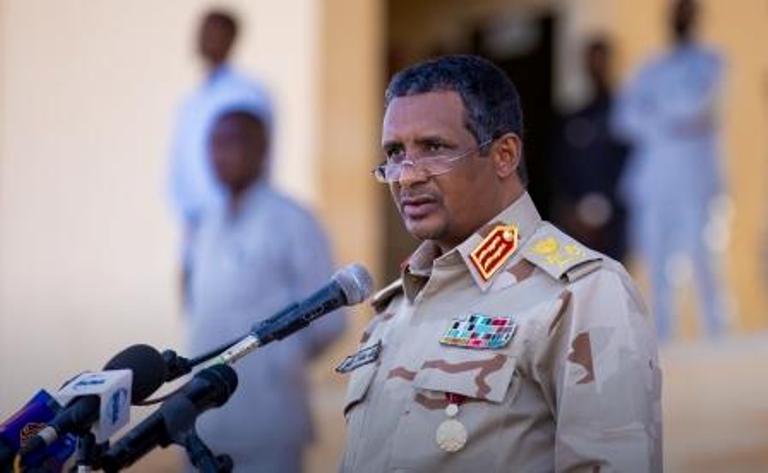
Sudan’s Rapid Support Forces commander Mohamed Hamdan Dagalo in a statement on Sunday unveiled the group’s vision for a comprehensive solution to the crisis in the country and the establishment of a new Sudanese state.
RSF commander said that the “current crisis is nothing but a reflection of the deepening governance crisis in Sudan since its independence.”
“It is thus an extension of the wars of Sudan in which groups or groups from the parties to Sudan tried to change Sudan for the better peacefully, but the leaders of the state, who remained and continued to rule by force, confronted them with violence.”
“The war, which is now raging in Khartoum, is but one of the cycles of armed conflict, which has been constantly flaring up for nearly seven decades of the life of Sudan.”
Dagalo said that RSF had been forced to wage a war imposed on them by “those seeking a return to totalitarian rule,” and that the solution to the current crisis can only be achieved by returning to a path of peace.
To return to a peaceful solution RSF had engaged with regional and international actors to discuss the root causes of Sudan’s wars with the largest gathering of civilian stakeholders involved in the efforts, Dagalo said.
“In order to achieve this, the RSF believes that there are general principles that must be adhered to in any future settlement, and specific issues that should be addressed,” Dagalo added, before revealing the group’s 10-point vision.
RSF’s 10-point vision for a comprehensive solution to Sudan crisis
1- The ongoing war in Sudan reflects the prolonged crisis the country has been under since its independence, necessitating a long-term ceasefire and a political solution addressing the root causes of conflict which starts with
1- The ongoing war in Sudan reflects the prolonged crisis the country has been under since its independence, necessitating a long-term ceasefire and a political solution addressing the root causes of conflict which starts with achieving a peaceful democratic transition, sustainable peace, and transitional justice.
2- Establish a civil and democratic government through fair and free elections. Encourage active participation of all Sudanese in political decisions and ensure representation from all regions.
3- Empower regions to manage their economic, political, social, and cultural affairs, while sharing powers and resources equitably with the national government. A non-symmetrical federal system is suitable for Sudan’s diverse nature.
4- Eliminate monopolistic power structures based on ideology, partisanship, family, clan, or regionalism to restore power to the people. Create a true republic where influence is gained through fair elections in a federal democratic system.
5- To achieve lasting peace, address structural violence by the state against Sudanese populations, especially in peripheral regions, efforts must encompass ending inequalities in political participation, wealth distribution, and social justice.
6- Involve a wide range of political parties, civil society, and stakeholders in negotiations. Avoid inclusion of elements from the old regime to maintain focus and effectiveness.
7- Combine political solutions with sustainable peace efforts, prioritizing participation of armed struggle movements, displaced persons, refugees, nomads, women, and youth from conflict areas.
8- Build a new, unified, professional national military institution, free from political influence, reflecting Sudan’s diversity in its leadership and base while adhering to civilian control and international standards.
9- Reform civil and military state institutions based on professionalism and nationalism, eliminating partisan or political influence for effectiveness, citizen service, and prevention of conflicts.
10- Uphold the principle of countering hate speech, enact legal reforms, and adopt policies promoting peaceful coexistence, acceptance, and mutual respect.
The statement added that the “great reality” in Sudan since December 2018 is the “victorious revolution” that opened the door for building a new democratic Sudan.
“Revolution was led by political, civil, professional and armed leaders and organizations known for their unwavering commitment to the cause of change and democratic transformation.”
“Therefore, participation must primarily include the forces that confronted the tyranny of the leaders of Al-Bashir’s ideological regime and brought it down, whether these forces are in the center or the periphery, led by professionals, resistance committees, youth and women,” statement said.
However, Dagalo emphasized in the statement that, “this participation should not include the National Congress and the elements of the old regime,” and accused them of working to impede democratic transition through war.
